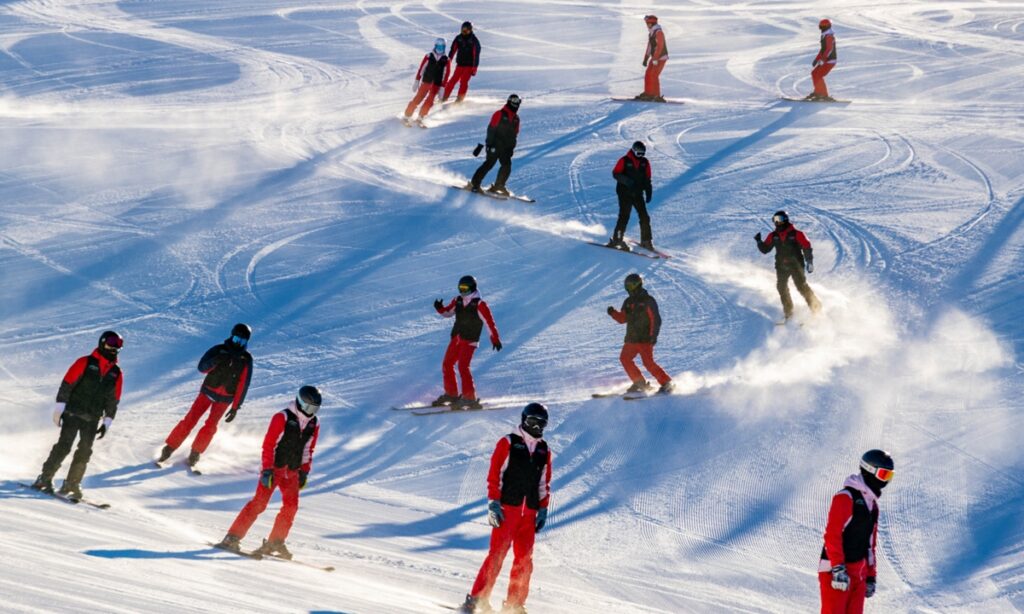In the midst of the winter chill, the New Year’s Day holiday is ticking down. Despite temperatures plummeting to new lows across places, the enthusiasm for travel and consumption in China is rapidly heating up, turning the “cold resources” into a “hot economy.” Experts noted that the Chinese economy remains on the trajectory of accelerating recovery, with new growth drivers continuously emerging which keeps fueling the momentum well into 2024.
Data from major travel platforms has indicated a comprehensive recovery for both domestic and cross-border tourism. First-tier cities like Beijing and Shanghai, along with the snow-covered Harbin in the Northeast China’s Heilongjiang Province and the warm South China’s island province of Hainan, are among the top destinations for New Year’s travel. The booking volume for tourism products has seen exponential growth amidst the frigid air.
“All our 30 rooms for the period from Friday to Sunday (December 29-31) are currently fully booked,” a staff member surnamed Zhang at the Shirton Inn, located near Nanshan Ski Resort in Beijing’s suburban Miyun district, told the Global Times on Monday.
“Due to our hotel’s proximity to the ski resort, some guests made reservations as early as a month in advance,” Zhang said.
An employee at Xishan Ski Resort in Beijing’s Haidian district told the Global Times that they anticipate receiving a daily influx of visitors exceeding 2,500 during the New Year’s Day holiday. Among the visitors, families with children are predominant, and there will be international tourists as well. “It is estimated that the visitors for the 2023-24 snow season will increase by 30 to 40 percent compared to the previous year,” the employee named Liu Jiahua said.
Domestic travel platform Mafengwo said in a note it sent to the Global Times on Monday that over the past week, the topics of “New Year’s trip destination” discussed on the platform have increased by 266 percent.
As of December 15, overall travel bookings for the New Year’s Day holiday had surged more than threefold compared to the previous year, with hotel reservations experiencing a remarkable increase of over fivefold. Airline ticket bookings have seen a remarkable growth of 205 percent year-on-year, according to data sent to the Global Times by the online travel agency Trip.com on Monday.
The tourism sector has shown a remarkable recovery throughout the year, especially with the speeded-up integration of “cultural, sports and tourism.” New business patterns are emerging, well embraced by consumers, and are expected to further propel the recovery of the economy, experts said.
During the recent held tone-setting Central Economic Work Conference in Beijing, Chinese leaders vowed to expand domestic demand, noting that efforts should be made to stimulate consumption with potentials and expand productive investment to create a virtuous cycle of mutual promotion between consumption and investment.
New growth areas such as consumption of smart home appliances, entertainment and tourism, sports events and trendy domestic brands should be fostered, it underscored.
‘1+1>2’
The nation has carried out various plans and guidance for the integrated development of “cultural, sports and tourism” which has seen gratifying progress during recent years, Jiang Yiyi, a deputy head of the School of Leisure Sports and Tourism at Beijing Sport University, told the Global Times on Monday.
Such integration has been proved effective and important to foster new businesses and stimulate economic vitality, Jiang said, highlighting that “this could generate a synergistic effect, where 1+1 is greater than 2.”
Per data released by the National Bureau of Statistics (NBS) on December 15, the services industry experienced rapid growth in November, as year-on-year growth of the national service production index came in at 9.3 percent, accelerating 1.6 percentage points compared to the previous month.
In the first three quarters, China’s total retail sales of consumer goods reached 34.2 trillion yuan ($4.79 trillion), up 6.8 percent year-on-year. Final consumption expenditure contributed 83.2 percent to economic growth in the first three quarters, contributing 4.4 percentage points to GDP growth. In the third quarter alone, final consumption expenditure contributed 94.8 percent to economic growth, NBS data showed.
In a recent exclusive interview with the Global Times, Steven Alan Barnett, senior IMF resident representative in China said that the performance in the first three quarters of this year was stronger than expected. A key factor was strong growth in household consumption.
“Continuing this pattern – household consumption growing faster than GDP – would be one key aspect,” Barnett said.
The New Year’s Day and the upcoming Spring Festival holidays constitute a traditional peak season for consumption. Coupled with the thriving winter consumption trends, from tourism and cultural activities to the brisk sales of winter heating products, all will significantly contribute to enhancing consumption vitality and driving economic growth in the new year, Zhang Yi, CEO of iiMedia Research Institute, told the Global Times on Monday.
He pointed out that compared to summer consumption, the development of winter consumption has only gained steam over recent years, but it possesses strong potential for future growth.
In addition to the booming domestic tourism and related consumption, China has also made concrete efforts to boost cross-border trips in the year, from optimizing entry and exit procedures to expanding the list of countries eligible for unilateral visa-free access.
Jiang noted that promoting inbound tourism is an integral part of the nation’s development pattern of “dual circulation,” in which domestic and overseas markets complement and reinforce each other, with the domestic market as the mainstay.
Meanwhile, Chinese tourists have been a crucial source of visitors for numerous international tourist destinations. With China continuously deepening its opening-up policies, both China’s inbound and outbound tourism will be significant forces in promoting the recovery of the international tourism industry, experts stressed.
(Global Times)




